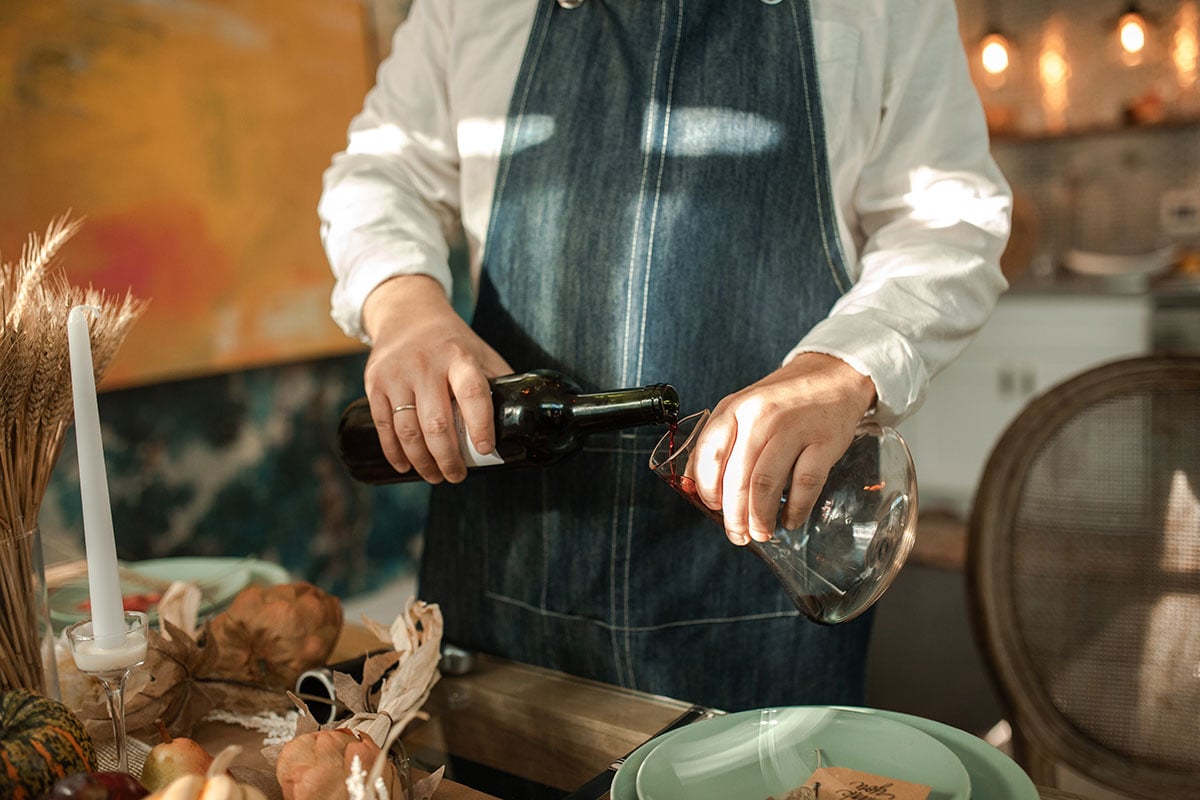

Getting the best flavor out of a great bottle of wine shouldn’t be too hard. Good winemakers know that most of the time their wine is going to be purchased, opened, and drank. There’s typically not going to be a step in between opening and drinking, but in some cases a decanter may be used to help enhance the flavor of the wine.
But what is a wine decanter, and does it really help improve the flavor of the wine? Does it work with all wines, or just certain types or styles?
Many people have seen a wine decanter, so they have a general idea of what one looks like, but not many people understand exactly what they are used for, or why they are used.
What is a Wine Decanter Used For?
A wine decanter is a glass vessel that is used to help aerate wine. It typically has a smaller neck and a wide base to allow for as much surface area of the wine to come in contact with the air as possible.
To decant a wine, you must slowly pour the wine from the original bottle into the glass vessel (decanter) without disturbing any sediment at the bottom of the wine bottle. It does take some skill to perform this task, which is why you may not get the best pour your first time, but it will eventually come naturally with some practice.
To properly decant your wine, you should follow a few simple steps.
1. 24 hours before you wish to decant your wine, set the bottle upright on a flat surface to allow all of the sediment to gather at the bottom of the bottle.
2. Once you’re ready to decant the wine, open the bottle and slowly tilt the bottle and begin pouring the wine into the decanter. Be sure to keep the bottom of the bottle as low as possible to help prevent the sediment from reaching the neck of the bottle. The whole point is to avoid drinking any sediment in the bottle, so pouring slowly helps control that.
If the sediment starts to reach the top of the bottle, stop pour and tilt the bottle back upright to allow it to settle back down before continuing to pour.
3. When you get near the bottom, you will need to leave a little wine in the bottle to prevent the sediment from ending up in the decanter.
Be careful when decanting some wines though, not all wines are made to be exposed to oxygen for long periods of time. While some wines may taste better sitting in a decanter for a few hours before drinking, other wines may oxidize and spoil, which could leave an unpleasant taste in your mouth.
How Long Should You Decant Wine?
Not all wines need to be decanted for long periods of time. In fact, certain wines will spoil and start to taste bad if exposed to oxygen for too long in a decanter.
If you have older wines that have been stored for a while, then you’ll want to decant them for around 2 hours. Older ones tend to taste best when the sediment is filtered out and the wine is allowed to aerate for a couple hours.
Full-bodied red wines like Cabernet Sauvignon, Syrah, and Malbec will taste best after 1-2 hours of decanting, while other red wines like Cabernet Franc, Merlot, and Pino Noir will benefit from only about 30-45 minutes of decanting time.
And contrary to what you may have heard, white wines can also benefit from being decanted, but you’ll want to limit the amount of time. 15-20 minutes at most for a white wine will allow just enough oxygen to interact with the wine, while not allowing the wine to spoil.
Is Decanting Wine Necessary?
In most cases the wine you buy is going to be drank rather quickly, so decanting a newer wine won’t really make that big of a difference in most cases. Winemakers are very good at perfecting their wine so that its flavor profiles are best experienced right after opening the bottle because they understand that most people buy modern bottles of wine to drink and not store.
Older bottles of wine that have been aged or have been sitting around for a while will benefit from decanting by filtering out and sediment or artifacts that may have ended up in the bottle during the winemaking process.
The aerating of the wine will also expose the wine to oxygen and can help bring out the aromas and flavors that were dormant in the bottle.
A great experiment would be to buy two of the same bottles of wine and decant one of them, while waiting and opening the other one just before you pour. This will give you an idea of the difference decanting can make with certain types of wines. It will help you determine if you can taste the difference and will give you a better understanding of whether or you not you think decanting is worth it.
Wine drinkers around the world differ on their thoughts on decanting, some won’t drink certain wines if they haven’t been decanted, while others can’t really tell the difference. Everyone’s taste buds are different, and everyone interprets flavors in a unique way, so while one person may swear by their decanter, you may not see what the big deal is. Having a decanter sitting on the table for guest to pour out of can also class up any party, but be sure to leave the actual bottle of wine near the decanter so that your guests can read the label of the wine as well.
